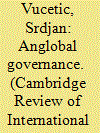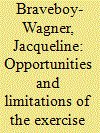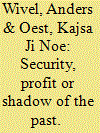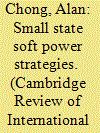|
|
|
Sort Order |
|
|
|
Items / Page
|
|
|
|
|
|
|
| Srl | Item |
| 1 |
ID:
098883


|
|
|
|
|
| Publication |
2010.
|
| Summary/Abstract |
The 'Anglosphere' refers to a grouping of English-speaking states, nations and societies united by the language, values and institutions associated with the historical experience of England/Britain. After being introduced in 1999-2000 at two conferences convened by the Hudson Institute, the idea of the Anglosphere has become increasingly popular with various Anglophiles and especially with Anglo-American conservatives and neoconservatives. After a brief inquiry into the broader conceptual and historical foundations of this neologism, this article considers some ways in which the Anglosphere relates to the research programme on global governance in the field of international relations (IR). Using 'liberal imperialism' as a theoretical starting point, the article evaluates the Anglosphere as a tool for promoting greater attention to the role of race and racism in the emergence of the structure and processes of contemporary global governance. For all its political, logical and other ambiguities, when approached as an arena of critical analysis, an Anglosphere perspective can indeed help us comprehend the development and general patterns of the racialized world order. For that reason alone, Anglobal governance should be worthy of study in IR.
|
|
|
|
|
|
|
|
|
|
|
|
|
|
|
|
| 2 |
ID:
098889


|
|
|
|
|
| Publication |
2010.
|
| Summary/Abstract |
Critical approaches and the legacy of the agent/structure debate in international relations
|
|
|
|
|
|
|
|
|
|
|
|
|
|
|
|
| 3 |
ID:
098881


|
|
|
|
|
| Publication |
2010.
|
| Summary/Abstract |
The idea that a microstate such as Trinidad and Tobago can possess and use 'power,' a trait generally associated with a high level of military and economic capability, would appear to a traditional realist to be absurd. This is largely because power is still seen as exercised at the global systemic level or at regional levels that are globally significant. However, small states generally focus their foreign policies on smaller circles, primarily neighbours and dominant bilateral partners. By moving the power analysis (back) to the state (foreign policy) level, extending the definition of 'power' to include status ('position') and actual attempts to get others to adopt an influencer's preferences, and employing the newer views of power as soft and smart, this article argues that even very small states can exercise power within limited domains as long as they possess certain capabilities (in this case, energy resources) and are ready to seize available opportunities. The evidence shows, however, that the results of these attempts are still mixed, limited primarily by perceptual constraints on the part of both the small-state influencer and the target influencee.
|
|
|
|
|
|
|
|
|
|
|
|
|
|
|
|
| 4 |
ID:
098885


|
|
|
|
|
| Publication |
2010.
|
| Summary/Abstract |
The relationship between psychopathology and world politics can be considered firstly from the world politics perspective. This means examining the dysfunctional forms of human behaviour manifest there-both individual and collective/communal. It means examining how such behaviour can be described and explained in psychiatric or psychological/psychoanalytical terms. The relationship between psychopathology and world politics can also be considered from the psychopathology perspective. This means examining some of the key psychopathological concepts that are of relevance to world affairs. It means examining paranoia or narcissism, for example, and the way understanding syndromes like these helps further our understanding of world affairs.
|
|
|
|
|
|
|
|
|
|
|
|
|
|
|
|
| 5 |
ID:
098882


|
|
|
|
|
| Publication |
2010.
|
| Summary/Abstract |
Which factors determine the security strategies of microstates? Many microstates are either secluded island states or have very close political, economic and cultural ties to a larger neighbouring 'protector state'. They have had, therefore, little use for more traditional alliance arrangements. However, the patterns of security cooperation between states have shifted as the significance of flexible ad-hoc coalition-building as a means to coordinate international interventions has increased. Consequently, the strategic security challenges and opportunities for microstates have been transformed. Focusing on the Operation Iraqi Freedom coalition, this article explores some of these challenges and opportunities. Three hypotheses regarding the decisions made by the respective microstates to join international ad-hoc coalitions are studied: (1) participation provides increased security, (2) participation provides economic gains, and (3) participation reflects the lessons of past security challenges. The explanatory powers of each hypothesis are examined using a comparative case study of 11 Pacific microstates.
|
|
|
|
|
|
|
|
|
|
|
|
|
|
|
|
| 6 |
ID:
098880


|
|
|
|
|
| Publication |
2010.
|
| Summary/Abstract |
The concept of soft power, or symbolic power, offers unexplored potential for analysing small state power. This article argues that it is a means of virtual enlargement of small states' foreign policy reach and presence. If one examines the bases of soft power, it becomes evident that small states can utilize their political economy potential, models of good governance and diplomatic mediation as forms of power that defy their territorial limitations. Case studies of the Vatican City State and Singapore illustrate 'small state soft power'.
|
|
|
|
|
|
|
|
|
|
|
|
|
|
|
|
|
|
|
|
|